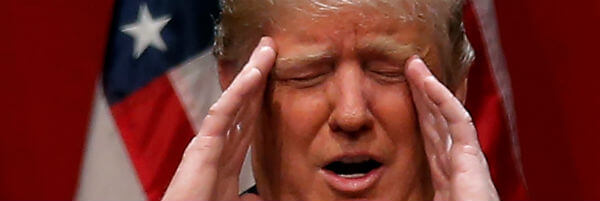
Politico reports: Amid reports suggesting that he and other staffers are beginning to “phone it in,” [Trump campaign manager, Paul] Manafort subtly shifted blame to his candidate. He admitted that Trump’s comments in response to Khizr and Ghazala Khan were “not smart.” And he made it clear that it’s Trump, not any adviser or ally bending his ear, who is responsible.
“Well, first of all, the candidate is in control of his campaign. That’s No. 1,” Manafort said in a TV interview. “And I’m in control of doing the things that he wants me to do in the campaign.”
He attempted to dismiss the “turmoil” as “another Clinton narrative that’s being put out there.” But sources close to the campaign tell a different story of dysfunction and dismay inside Trump Tower.
“There’s just not much communication going on. It’s really sad, to be honest with you. They really just aren’t working as a team. Everyone’s just doing their own little thing,” said one former Trump adviser, who spoke on the condition of anonymity. “I just wish he’d stop answering the questions. People don’t want a politician and they got someone who’s not a politician, so he’s going to make these kind of mistakes.”
This adviser said Trump “literally can’t help himself” in responding to perceived slights or taunts — and that his team and closest allies are demoralized and frustrated, especially over the apparent disconnect between Trump and the RNC.
The adviser said Trump had easily bounced back from other controversies, but this latest round borders on a point of no return. “It feels like we’re close to it.” The only silver lining? “Republicans’ intense hatred for Clinton. You remind yourself who the opposition is.”
Clinton, however, has largely skated past her own unforced errors — she wrongly asserted in an interview Sunday that FBI director James Comey had praised her truthfulness during the investigation into her use of a private email server — because Trump’s behavior since the Democratic National Convention has been all-consuming.
All week, in fact, the GOP nominee has been stomping on what might have been another opportune news cycle. The Democratic National Committee is going through a public purge as its CEO, communications director and chief financial officer all left on Tuesday, days after Chairwoman Debbie Wasserman Schultz resigned under pressure. Meanwhile, The Wall Street Journal reported on a “secretly organized” airlift of $400 million to Iran that coincided with the release of four Americans in January.
In the past 48 hours, however, Republicans criticizing Trump and, in some cases, leaving the party altogether and declaring their support for Clinton, have dominated the news cycle. Following reports that Sally Bradshaw and Maria Comella — former staffers to Jeb Bush and Chris Christie, respectively — were backing Clinton, former GOP California gubernatorial candidate and Hewlett-Packard CEO Meg Whitman announced Tuesday that she was not only following suit but planning to make a significant financial contribution to the Democrat’s campaign.
Christie and Gingrich, two of Trump’s closest allies and runners-up to serve as his running mate, have also blasted the nominee’s response to a Muslim family whose son was killed in Iraq, while also criticizing Trump’s especially undisciplined, unfocused performance over the past week. [Continue reading…]
Of late, expressions such as “unfit for high office” or “unfit to serve” have frequently been applied to Trump.
The problem with a vague concept like unfit is that it can too easily be reconstructed and taken to mean, “does not meet the approval of the establishment.”
To Trump’s supporters, this is likely to sound like Trump is yet again being condemned for the very reason they like him.
The issue is not simply that Trump is unfit to become president, but more specifically, the aspects of his personality that render him unfit.
The perennial question posed to every presidential candidate is, how will she or he handle a national security crisis?
Trump is famously unpredictable. He might see that as an asset — that it gives him an advantage over adversaries who can’t get one step ahead of him. Moreover, the fact that he’s unpredictable doesn’t explain why he’s unpredictable.
What is blindingly evident right now, however, is that Donald Trump is a man who is unpredictable because he possesses no self-control.
Faced with a crisis, no one knows — including the candidate himself — what Trump would do. This is what makes him unfit for office.
To elect Trump would be to turn the presidency into a game of Russian roulette.
Given that danger, to characterize this election as yet another contest to determine who is the lesser of two evils is to apply a crude equivalence between the candidates as though they differ merely in the degree to which each is objectionable.
But each American voter has a greater responsibility than to simply give voice to their personal likes and dislikes.
At this juncture in history, in spite of America’s ebbing power, the U.S. presidency is still the most powerful political office in the world. This isn’t a game show.
The fact that Trump has become the Republican nominee is an indication of a deep malaise in American politics and American culture in which serious issues perpetually become trivialized.
As voters, however, we aren’t mere spectators who can sit back and observe how this show plays out. We determine the outcome.


If I were Putin, Trump would be my best choice as his unpredictability and contempt for everything not-Trump is surely to wreak havoc in the US, and specially, across the wide spectrum of alliances that the US has painstakingly assembled since the end of WWII.